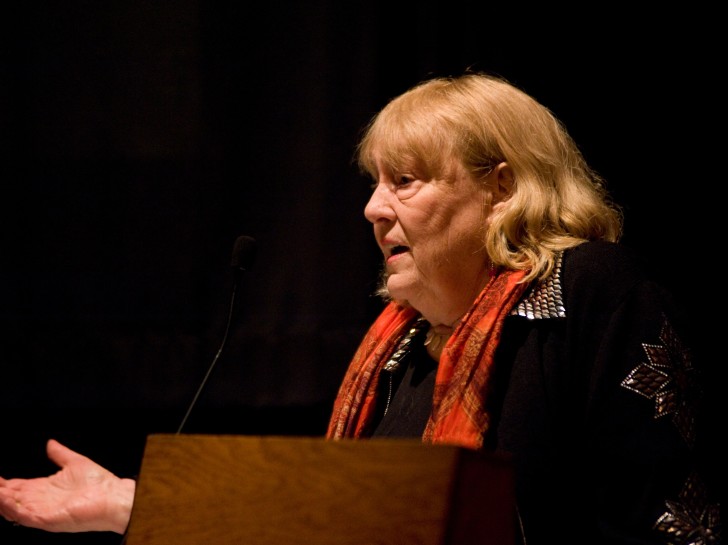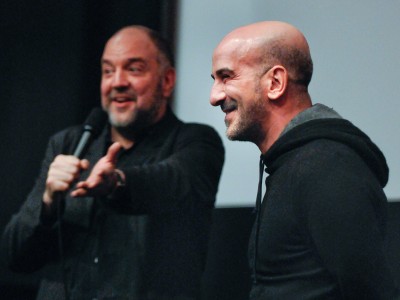
Forty Guns introduction by Christa Lang Fuller and Haden Guest.
Transcript
John Quackenbush 0:00
July 17, 2015. The Harvard Film Archive screened Forty Guns. This is the recording of the audio introduction by Haden Guest, HFA director, and actor Christa Lang Fuller.
Haden Guest 0:16
[INITIAL AUDIO MISSING] —absolutely thrilled to be here tonight to present one of my favorite films and one of my favorite people. The film is Forty Guns. And it marks a major and very important high point in the extraordinary career of Sam Fuller, the filmmaker whose work we're celebrating with a complete retrospective this summer. It's from 1957, and it was a film made while he was at 20th Century Fox, and working very closely with the visionary head of production there, Darryl F. Zanuck. Like Fuller, Zanuck understood storytelling. He was a master storyteller himself. When he was at Warner Bros. as a young man, he was such a prolific writer—writing, for example, the many Rin Tin Tin stories—he used something like six or seven different names. And so he found a kindred spirit with Sam Fuller, whom he encouraged, and he really gave free rein, and the results are some of, I think, Fuller's most inventive, and really powerful films. Forty Guns is a Western, but it's a Western like none other I think you have seen. It's a subversive, and just visually astonishing film from its very opening shot. We have a beautiful 35mm print, which comes to us from Fox Studios.
This is a very, very special occasion. We're joined tonight to introduce the film by Christa Lang Fuller, Sam Fuller's wife and also the star of Dead Pigeon on Beethoven Street, an important late film in Fuller's career. And the director's cut of that film—the extended version of that film—has been restored recently by our friends at UCLA, and Christa will be joining us to present that film. We're also joined this weekend, though, by Samantha Fuller, Sam and Christa Fuller's daughter, who is, I can say now, a fellow filmmaker, with her father, and she's made a film called A Fuller Life, which is a really lovely tribute to her father's films and writing. We'll be seeing that on Sunday. Also, at the end of this screening, Samantha has brought some rare treasures from the Sam Fuller Archive—some production stills and other materials from Forty Guns. And we're going to have a little show-and-tell in the office of the Harvard Film Archive, for those of you who would like to linger and take a look at these really wonderful documents and quite amazing photographs. But for now, to say a few words about Forty Guns, I give you Christa Lang Fuller!
[APPLAUSE]
Christa Lang Fuller 3:28
Hi! I'm happy there's a crowd. I just got back from Munich. I was on the jury of the Munich Film Festival, and I'm a bit jet lagged. So I'm happy to introduce Sam Fuller's movie. Sam Fuller was my husband. Still is. I hate to say the word "widow." That sounds so tragic. When I saw Forty Guns, I must have seen it, I don't know how many times. It's one of the favorites of Cahiers du Cinéma. Truffaut rhapsodied, and Godard, about the film. They said it's so full of invention, and it is. Right from the beginning of the opening scene, you'll be riveted in the seat, but it's also full of comic touches. Poor Sam, you know, he always had to do film noir and Western. And they think he is this macho guy, but he wasn't. As a matter of fact, the film is very much anti-gun, if you can see. It's not a film that sells you guns. You see the character of Barry Sullivan and what he says about violence. Sam, even though he made violent films, they were all anti-violence films. If he made war movies, they were anti-war movies. And he experienced war from firsthand.
Get back to Forty Guns... It's one of my favorites of Sam's. I could see it over and over again. And I always see new touches that he put into the film. Barbara Stanwyck was 50 years old when she made the movie, and she's fantastic. It's a very sexual film as well. Sam put a lot of sexual innuendos in there, because people think Forty Guns are forty guns, but they're actually forty of her lovers. And there even is a scene where she pays off the guy. Usually—sort of a gender reversal. Usually, a man, you know, says, “Here's $10,000 dollars, beat it!” to a woman. But she does it to a man. We saw the film when Sam was still alive, in Locarno, on the Piazza Grande. And when the film was over, on a huge screen, which was great to see the film on a huge screen, and young women came over that couldn't believe that Sam made this film in 1956. And that it was a studio picture. "How did you get away with it, Sam?" they asked him. Now I don't know how he got away with it, but he did. And I'm happy you all can enjoy the film. I'm happy to see it again with you. There are lots of things I could tell you. I could talk a whole hour about Sam and his work. And let's go and see Forty Guns together. And if you want to ask afterwards any questions, let me know. But it's a film that's right in your face, [so] just sit back and enjoy. Okay, that's it.
[APPLAUSE]
Haden Guest 6:31
We're actually gonna begin with a trailer for Hell and High Water. This is a vintage trailer that comes to us from the Academy Film Archive. So an extra treat for you for an upcoming and wonderful feature by Sam Fuller—Hell and High Water. And followed by Forty Guns.
©Harvard Film Archive
Related film series
Explore more conversations
Rabah Ameur-Zaïmeche

Sky Hopinka

Pavle Levi & Nace Zavrl


